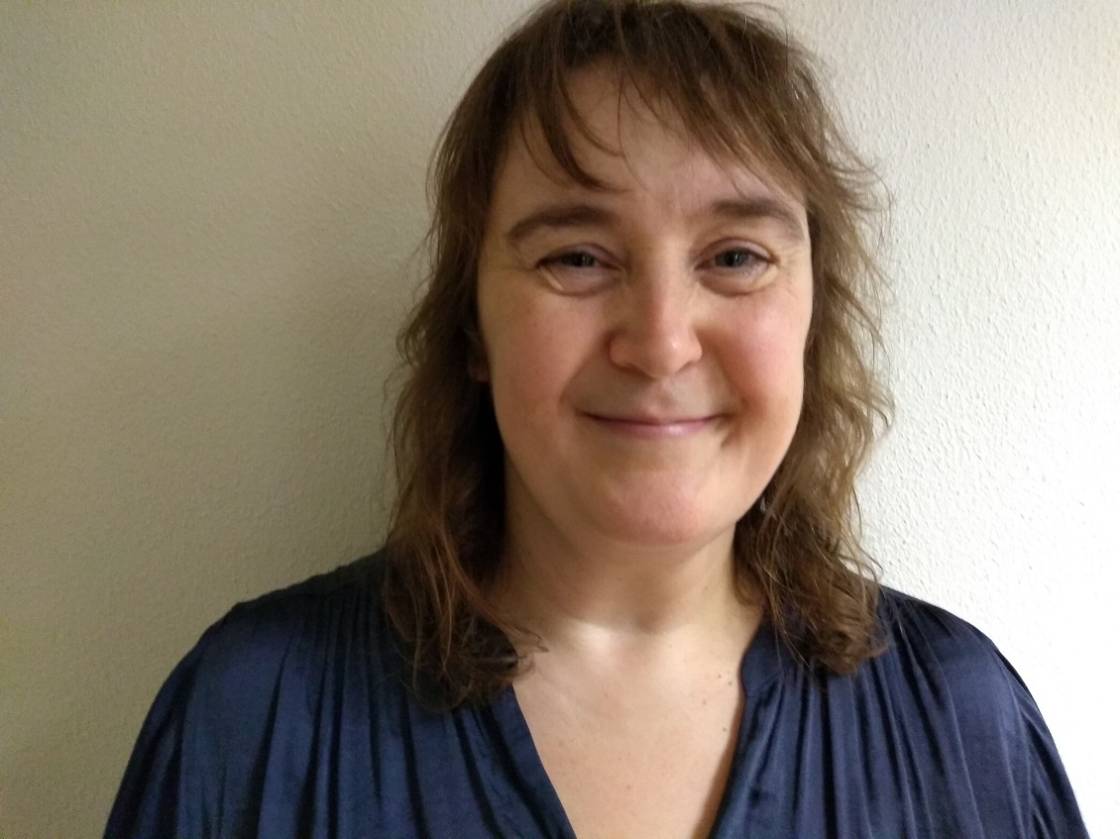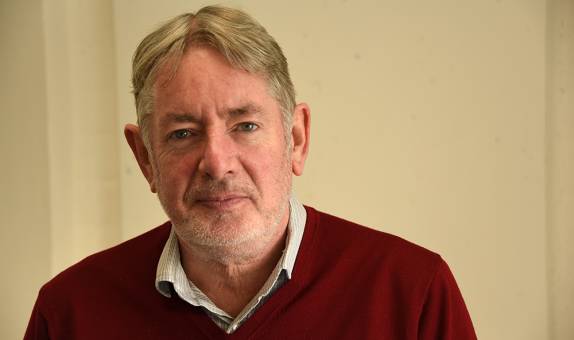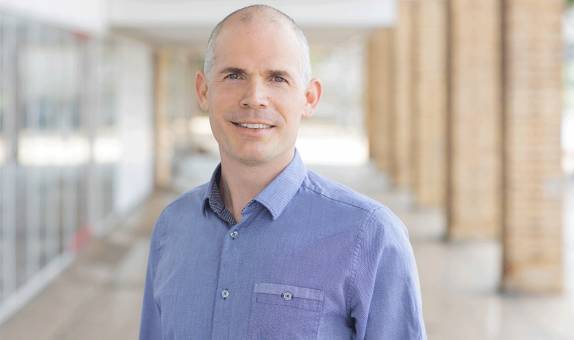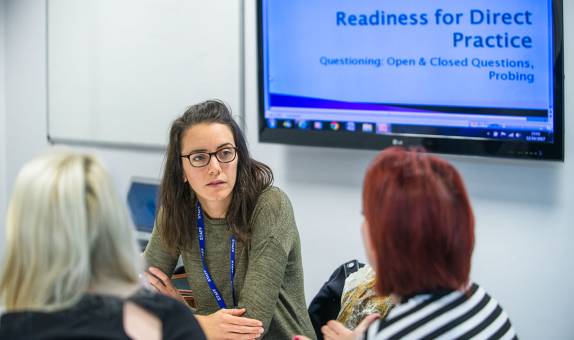Advanced Social Work MA
Why choose this course?
All course modules enable you to apply your learning directly to your practice. You may combine specialist studies with more general learning, such as safeguarding, practice education and management.
Our purpose-built Practice Learning Suite is perfect for honing your skills.
For the PgCert, you will need to complete 60 credits; for the PgDip, you will need 120 credits; and for the MA, you will need 180 credits, including the final project worth 60 credits.
Free-standing modules may be taken as short courses as part of your continuing professional development.
| Mode | Duration | Attendance | Start date |
|---|---|---|---|
| Part time | 3 years | 1–3 days a week depending on module choice |
January 2025 September 2025 |
Please note: you can take free-standing modules as part of your continual professional development (CPD) in social work. The following qualifications are also available:
- Professional Development in Social Work PgCert
- Professional Development in Social Work PgDip
| Main Location | Kingston Hill |
Reasons to choose Kingston University
- The course incorporates recent changes in social work education and regulation. These include the Chief Social Workers' Knowledge and Skills Statements and revised Professional Standards for Social Workers set by Social Work England.
- You can create a programme that suits your needs by selecting from a range of modules to build up credits towards a PgCert, PgDip or MA.
- You will have excellent opportunities to network with experienced practitioners in specialist roles.
What you will study
This flexible format allows you to construct a programme of study to suit your professional profile and areas of developing expertise while benefiting from exchange with practitioners in other specialist roles.
You can combine specialist components across adult and children's services, such as Safeguarding Across the Life Course, with generic elements, such as supervision, professional education and decision-making.
Modules
You will need to successfully complete two 30 credit modules to gain the postgraduate certificate; four 30 credit modules to gain the postgraduate diploma; and four 30 credit modules plus the 'capstone' project to gain the MA.
Available modules
Best Interest Assessor
30 credits
On the successful completion of this module, you will be awarded the title of BIA which will allow you to practise as a BIA, and undertake assessments to determine if a person is deprived of their liberty and if that deprivation is lawful and appropriate.
Assessment for this module requires you to complete a 3,500-word essay based on a selected practice case study that enables you to demonstrate an applied knowledge of the legislative framework of the codes of practice and case law related to the Mental Capacity Act 2005 and Deprivation of Liberty Safeguards.
Please note: This module is only available for those in the following professional groups, who must have at least two years post-registration experience at the point of starting the module (Mental Capacity Regulations (2008)). This includes:
a) approved mental health professionals;
b) social workers registered with the Social Work England;
c) first level nurses, registered in Sub-Part 1 of the Nurses' Part of the Register maintained under article 5 of the Nursing and Midwifery Order 2001 (e);
d) occupational therapists registered in Part 6 of the register maintained under article 5 of the Health Professions Order 2001(c); or
e) chartered psychologists who are listed in the British Psychological Society's Register of Chartered Psychologists and who hold a relevant practising certificate issued by that Society
Individual Work-based Learning Project
30 credits
This module provides an opportunity for students to undertake, under academic supervision, work-based projects and gain credit for this work. The work-based learning approach assumes self-directed and autonomous learning. The module develops the student's own critical reflection skills and to work as a mature self-directed student. Learning outcomes and the method of working will be agreed jointly by the student, module leader / academic supervisor and workplace mentor. The assessment strategy is based upon the principle that work based activities can be used to generate critical reflection and learning outcomes. The assessment submission can take a variety of forms such as reports, essays, discussion documents, and practice analysis.
Mentoring and Coaching in Professional Practice
30 credits
This module aims to equip students to mentor and coach fellow professionals at post-registration levels. It promotes critical evaluation of theoretical, professional and policy approaches to mentoring and coaching in professional practice in social work and health and social care. The knowledge, understanding, values and skills necessary for, mentoring and coaching professional practice in social work and health and social care and related settings are examined. Students are assisted to develop strategies and techniques to enhance their skills in professional self-development, developing services, coaching and mentoring professional colleagues in different practice settings. Students are required to provide a minimum of four mentoring or coaching sessions to a colleague as part of the practicum for this module.
Practice Education Stage 1
30 credits
This module equips registered social workers to undertake the responsibilities of a Stage 1 Practice Educator (Practice Educator Professional Standards (PEPS) of the British Association of Social Workers (BASW). Students who complete this module successfully will be able to supervise, teach and assess social work degree students up to, but not including, the final assessment prior to qualification. At this stage, they may contribute to the last placement but not take full responsibility for assessment or act as the practice educator on a day-to-day basis. Students undertaking this module are required to undertake a practicum which entails acting as a Stage 1 practice educator to a degree in social work student on a first placement (70 days).
This module is only available to registered social workers with two or more years' more post-registration practice experience. It is targeted at social worker/experienced social worker level.
Practice Education Stage 2
30 credits
This module equips registered social workers to undertake the responsibilities of a Stage 2 Practice Educator (Practice Educator Professional Standards (PEPS) of the British Association of Social Workers (BASW). Students who complete this module successfully will be able to supervise, teach and assess social work degree students up to and including the last placement and to work with ASYE candidates. In effect, these practice educators will have the authority and capability to recommend, on the basis of appropriate evidence, that the social work students are fit to practise at the point of qualification. The module includes practice assessment.
This module is only available to registered social workers with three years or more post-registration practice experience and who have completed Practice Educator Stage 1 or equivalent. It is targeted at experienced social worker level.
Safeguarding Across the Life Course
30 credits
This interdisciplinary module aims to address current issues in safeguarding by providing students from different disciplines and agencies opportunities to learn together and develop a better understanding of collaborative approaches to safeguarding those at risk across the life course.
The module will take a holistic safeguarding approach and promote local authorities' national agenda a ‘Think Family' approach, referring to the need for children's, young people's, and adults' practitioners to identify wider family needs which extend beyond the individual they are supporting.
This module is taught over 5 days and will promote joint learning with all students attending days 1 and 2. On days 3 and 4 you will be able to take the option to explore a child- or adult-specific safeguarding topic, then return to the wider group on day 5 to share your learning and present ideas for formative feedback on your assignment plans.
The assignment requires you to submit an essay that demonstrates how you have applied the knowledge gained from this module to a case from your practice. This will enable you to demonstrate your understanding and consider how you can embed the learning gained from this module into future practice.
Required module (MA students only)
Final Research Project (Capstone)
60 credits
This module is required for students undertaking studies at masters level and is normally taken after achieving PG diploma level. The module will provide students with the experience of using principles of research and academic writing and thus demonstrate the intellectual skills learnt on the course. Students are expected to critically review research and to evaluate the evidence underpinning their own practice. The module will provide students with the opportunity to implement the knowledge and skills developed during the previous modules by conducting research focused on a topic of their choice related to their area of practice with the support of a research supervisor. The module will enhance students' presentation and publication skills as the assessment includes writing an abstract, oral presentation and writing an article suitable for publication in a peer reviewed journal.
Please note
Optional modules only run if there is enough demand. If we have an insufficient number of students interested in an optional module, that module will not be offered for this course.
Entry requirements
Teaching and assessment
The MA in Advanced Social Work offers a structured professional development pathway to assist qualified social workers in meeting capabilities and standards of practice that are consistent with the role of experienced and advanced practitioners.
It incorporates core elements relating to social work education and professional regulation, such as the Professional Capabilities Framework for Social Work (PCF) and standards for continuing professional development set by Social Work England and the Chief Social Workers' Knowledge and Skills Statements.
Who teaches this course?
Every member of the teaching staff has substantial practice experience in social work. In addition, many are actively involved in social work research, presenting regularly at conferences and publishing in books and journals. In addition, our course teams draw on the wealth of experience provided by our professional contacts and people with lived experience and carers who feed into the design of our courses and provide teaching and supervision to enrich your learning.
We have strong links with the NHS, education and healthcare providers and social services, and we also offer classic postgraduate programmes alongside research and continuing professional development (CPD) opportunities.
Course fees and funding
Here you can find more details about fees for this course, as well as any funding opportunities available to you for this course. Please note that fees relate to the academic year in question and will increase in future years.
Additional costs
Depending on the programme of study, there may be extra costs that are not covered by tuition fees which students will need to consider when planning their studies. Tuition fees cover the cost of your teaching, assessment and operating University facilities such as the library, access to shared IT equipment and other support services. Accommodation and living costs are not included in our fees.
Where a course has additional expenses, we make every effort to highlight them. These may include optional field trips, materials (e.g. art, design, engineering), security checks such as DBS, uniforms, specialist clothing or professional memberships.
Social Work Skills Lab
The skills lab is a purpose-built facility where social work students have the opportunity to learn and to practise key social work skills.
Social workers undertaking continuing professional development courses develop their assessment and intervention skills and other skills such as mentoring, teaching and providing reflective supervision.
What's available?
The skills lab is divided into several sections including:
- a seminar/case conference room for a maximum of 20 people;
- a simulated living-room and front door to assist in developing skills relating to home visits;
- five interview rooms simulating work environments;
- a control room with two-way mirror and viewing monitors; and
- all rooms have fitted cameras and microphones so that activities can be recorded.
A flexible, creative space
The skills lab has been designed to be a multi-functional space which allows flexible use. The furniture is all portable and can be changed according to the simulated activities required.
The small rooms can be used for practising communication skills and simulating supervision sessions.
The large room can be used as a teaching or seminar room and can be set up as a simulated case conference room or duty desk.
Participants have the opportunity to engage in creative skills development activities and benefit from live supervision and feedback from the recorded material.
Where this course will take you
This degree programme offers a structured professional development pathway to assist qualified social workers in meeting capabilities and standards of practice that are consistent with the role of experienced and advanced practitioners.
The skills and knowledge gained through this degree will assist practitioners at these levels in undertaking diverse roles such as team leader, workforce development manager, service manager, principal social worker, and other senior leadership and management roles. This course also offers a route to undertaking further research and scholarship potentially leading to doctoral studies.
Links with business and industry
We are involved in a unique teaching partnership with seven local authorities and two voluntary sector agencies, including Achieving for Children, Croydon Adult and Children's services, Kingston Adult services, Merton Adult and Children's services, Sutton Adult and Children's services, Richmond & Wandsworth Adult services, Wandsworth Children's services, NSPCC and Welcare, Surrey Children's services, South West London and St George's Mental Health Trust.
Practising social workers are involved in teaching, bringing theory to life with their front-line experiences.
People with lived experience and carers contribute to assessment and quality assurance on our programme.
Current research in this subject
Many of our staff are research active, often in partnership with NHS Trusts. This ensures they are in touch with the latest thinking and bring best practice to your studies.
Social work research activity focuses around several key areas:
- risk and child abuse
- children's rights
- learning processes and partnership approaches in professional education
- management of child protection systems
- safeguarding adults
- mental capacity
- effectiveness of community-based responses to crime.
We conduct much of our social care research and consultancy either in partnership with or on behalf of the social service, voluntary sector and probation agencies.
What our students say
I gained my Postgraduate Certificate in Social Work at Kingston University in 2011. I had been a practitioner with Wandsworth Borough Council for several years and this helped to bring the learning and theory together. I was excited by both study and sharing learning with others.
Soon I was on the Practice Educator course, supporting students in different ways. When the opportunity to become a teaching consultant arrived, I was hooked! Training and reflection around this brought extra academic credits. It fitted with my role as a Professional Practice Development Assessor (PPDA), assessing newly qualified social workers on the Assessed and Supported Year in Employment programme.
At Kingston University, I was diagnosed with dyslexia and got to know myself a little more. In my work with the Teaching Partnership, I used this experience to share understanding of dyslexia and other differences that might impact access to learning.
The Covid lockdown brought a shift and change to social work supervision and inspired my Capstone project. I enjoyed completing the research around virtual social work supervision and would love to do some more! I notice my confidence in academia has increased and it has brought energy to my PPDA role and SRA/Practice Assessor role with Kingston University. Being able to reach others and support learning in different ways is great."
Sue Connell, MA Advanced Social Work 2021

Course changes and regulations
The information on this page reflects the currently intended course structure and module details. To improve your student experience and the quality of your degree, we may review and change the material information of this course. Course changes explained.
Programme Specifications for the course are published ahead of each academic year.
Regulations governing this course can be found on our website.










